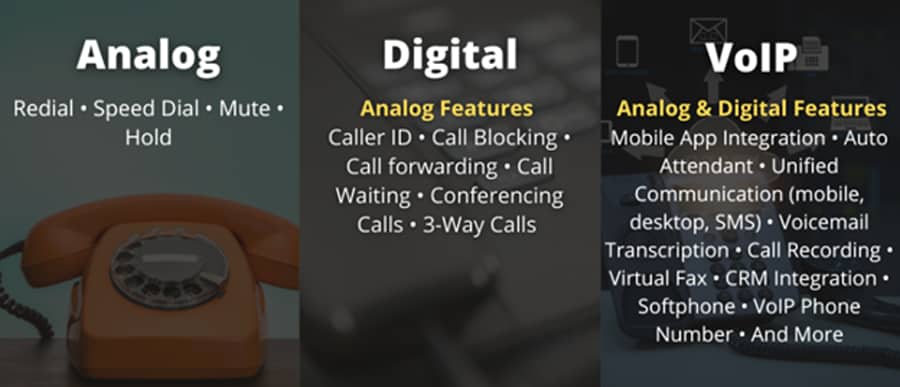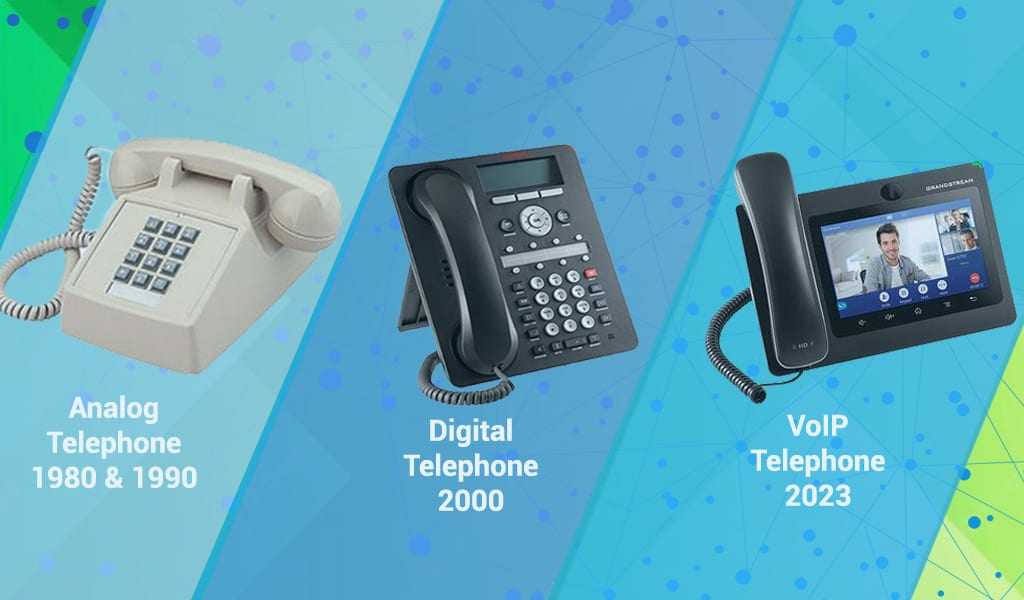
Telephony is a critical part of any business. It’s how we communicate with our customers, vendors, and partners. In the past, the only way to get telephone service was through analog technology. But in recent years, digital and IP telephony have become more popular. So, what’s the difference between these technologies? And which one is right for your business?
In this blog post, we will explore the differences between analog, digital, and IP telephony, and help you decide which one is best for you!
Analog Telephony, or Pots
Analog telephony has been around for decades. It uses an analog signal to transmit voice data over a traditional phone line. Analog telephony is reliable and easy to use, but it Recommendationas some drawbacks. One of the biggest disadvantages of analog telephony is that it is not very efficient. Because it uses an analog signal, there is a lot of room for error. This can result in static, dropped calls, and other problems. Additionally, analog telephony is not very scalable. If you need to add more phone lines, you will need to install more equipment.
Plain old telephone service, or analog telephony, utilizes the constrained RJ-11 socket to handle your regular phone, fax machine, and modem. Analog telephony is sometimes referred to as POTS. When using analog technology, audio (such as your voice) is converted into electrical pulses. You most certainly have an analog phone at home or are accustomed to using one. Since it has been around the longest, this technology is also the most affordable. Although it is inexpensive, analog has a cap on the amount of data that can be transferred. As a result, if your company has a large number of employees, you probably need to use a VoIP system, which we’ll cover in more detail later.
Digital Telephony, or ISDN
Digital telephony uses a digital signal to transmit voice data. Digital telephony is much more efficient than analog telephony, and it is also more scalable. You can add more phone lines without having to install additional equipment. Additionally, digital telephony offers features that are not available with analog telephony, such as caller ID and call waiting. However, digital telephony can be more expensive than analog telephony, and it requires special equipment.
Digital telephony is more beneficial to your company than analog, and as was already said, it can send more data. Additionally, whereas digital transmissions maintain their quality over great distances, analog signals do not. This is due to the way that digital technology functions, which encodes audio into numbers at one end and decodes those numbers back into audio at the other. The advantage of using digital telephones is that the audio encoded at one end and decoded at the other end is identical. A key service unit, often known as a KSU, is essential for digital phones in order to function.
IP Telephony, or VoIP
IP telephony uses the Internet Protocol (IP) to transmit voice data. IP telephony is very efficient and scalable. You can add more phone lines without having to install additional equipment. Additionally, IP telephony offers features that are not available with analog or digital telephony, such as VoIP (Voice over IP). However, IP telephony can be more expensive than analog or digital, requiring special equipment.
VoIP, or voice over internet protocol, telephony, uses the internet to make phone calls rather than traditional phone networks. VoIP is actually a form of digital telephony, and since it offers so many more features than its forerunners, it has become the current commercial standard for phone systems. Since companies may now use their computer or IP phone to conduct phone calls, convenience and affordability are two important elements in the VoIP revolution. It’s crucial to note that analog phones utilize the smaller RJ-11 socket, but IP telephony uses the larger/wider RJ-45 Ethernet plug.
The various telephone technologies and their functions are just briefly covered in this article. We invite you to conduct further studies on a particular technology or to get in touch with us if you have any queries. You should remember after reading this article that selecting the proper technology will be heavily influenced by your budget and bandwidth requirements.
IP telephony, or internet protocol telephony, refers to a system that uses internet protocols to transmit voice, video, and other forms of communication over a network. This includes voice over IP (VoIP) systems, which are used to make phone calls over the internet, as well as video conferencing and other types of communication.
So, which type of telephony is right for your business? If you need a reliable and easy-to-use solution, analog telephony may be the best choice. If you need a more efficient and scalable solution, digital or IP telephony may be the better choice. And if you need the most features and flexibility, IP telephony may be the best option. Whichever type of telephony you choose, make sure you partner with a reputable provider who can offer the services and support you need.
Recommendation
One key difference between analog and digital telephony is the quality of the signal. Analog signals can be prone to interference and degradation, while digital signals are generally more stable and provide higher quality audio. IP telephony offers additional features and capabilities, such as the ability to make calls over the internet and integration with other forms of communication and collaboration tools.
We know that upgrading can be scary, but when it comes to bringing your phone system into the 21st century (and beyond), a VoIP system is about as painless as it gets. If you’re curious about the cost, the installation progress, and what a new phone system can do for your hotel, get in touch with Phonesuite today! We’ll explain the product, the process, and how you can get started on an upgrade.
As a leading hotel PBX system and communications provider for over 25 years, Phonesuite Direct remains 100% dedicated to the hotel industry. Our modern, flexible innovative hotel communication solutions offer hotels the choice between cloud-hosted and on-premise PBX platforms that support both VoIP and analog guest room phones utilizing the same feature-rich software for all installation types. Our SuiteSIP trunking solution offers significant cost savings over traditional T1/PRI services and is designed around the unique needs of hotels. We get you talking!



